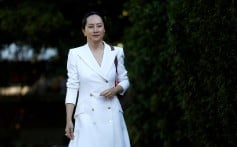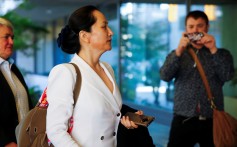HSBC only continued to do business with Huawei because of Meng’s claims that the firm had cut ties with Skycom, a company operating in Iran, lawyers say
The government lawyers say the fraud charge satisfies a requirement of ‘double criminality’ for her to be extradited to the US
Ian Young in Vancouver Published: 11 Jan, 2020

Banking giant HSBC took part in billions of dollars of loans to Huawei because CFO Meng Wanzhou (pictured with an ankle bracelet at her home in Vancouver) allegedly had deceived the bank about its activities in Iran, says the Canadian government. Photo: Reuters
Huawei executive Meng Wanzhou’s request for the dismissal of the US extradition case against her must be rejected because her alleged offence was not breaking US sanctions on Iran, but defrauding HSBC, Canada’s attorney general said on Friday.
Meng’s lawyers had argued that she should be discharged because the US case was based on alleged breaches of American sanctions on Iran, which are not crimes in Canada. This failed the extradition requirement of “double criminality” under which an extraditable offence must represent a crime in Canada, as well as the requesting state, they claimed.
But in a submission released on Friday, the Canadian government lawyers representing US interests in the extradition case said “the essence of the Applicant’s offending conduct is fraud, not violating sanctions”.
The bank had taken part in billions of dollars of loans to Huawei because Meng allegedly had deceived the bank about its activities in Iran, they said.

Meng Wanzhou leaves her home in Vancouver for a court appearance in October, wearing an electronic ankle tag. Photo: Bloomberg
“[Meng’s] misrepresentations put HSBC’s economic interests at risk by preventing the bank from accurately assessing the risks of maintaining a business relationship with Huawei,” said the attorney general’s lawyers, referring to a 2013 meeting in Hong Kong at which Meng told HSBC that Huawei had cut ties with Skycom, a company operating in Iran.
This was intended to reassure the bank that it was not in breach of US sanctions on Iran by doing business with the Chinese telecoms giant, the lawyers said.
Relying on Meng’s assurance, the bank continued to do business with Huawei, the Canadian lawyers said. But “had HSBC known of Huawei’s activities that breached American sanctions against Iran, HSBC would have re-evaluated its relationship”, they said, and “as a result of [Meng’s] misrepresentations about the Huawei/Skycom relationship, HSBC risked fines and penalties”.
Meng Wanzhou wins Canada court fight to see documents related to arrest
11 Dec 2019

Nevertheless, “this case is not about sanctions against Iran”, and the fraud case could be established without reference to the US sanctions regime, they said.
Meng was arrested on December 1, 2018, on a flight stopover in Vancouver, where she remains ahead of her formal extradition hearings.
The submission by the attorney general’s lawyers said that based on Meng’s assurances, HSBC had negotiated a US$900 million credit facility for Huawei in 2014, and took part in a syndicate that loaned US$1.5 billion to Huawei in 2015.
Huawei launches new legal action against FCC’s rural carrier purchase ban
“The fact that HSBC may have suffered no financial loss is legally irrelevant,” the lawyers said, adding that her “alleged dishonest act induced HSBC to continue to provide financial services when otherwise it would not have done so”.
“At the very least HSBC was denied the opportunity to make a decision about its economic risk based on an appreciation of material facts,” they said.
The submission described how HSBC had already been hit with US$1.7 billion in forfeitures and penalties in 2012 as a result of its violation of US sanctions on Iran, Cuba, Libya, Sudan and Myanmar.
As part of a deferred prosecution agreement with the US, HSBC would have been subject to criminal charges if it was caught breaking US sanctions again.
Meng Wanzhou fears cameras in court would trigger Trump ‘threats’
30 Nov 2019

It was only because of Meng’s alleged misrepresentations at the 2013 Hong Kong meeting that HSBC retained Huawei as a client, the submission said.
After months of preliminary hearings, Meng’s formal extradition hearing is expected to begin in the British Columbia Supreme Court in Vancouver on January 20, with appearances pencilled in to continue as late as November.
Her detention has been at the centre of escalating tensions between China and the West, amid a trade war with the US and intense debate about whether to allow Huawei to participate in high-speed 5G internet networks around the world.
Canada-China relations are at an all-time low, after China arrested Canadians Michael Kovrig and Michael Spavor 13 months ago. They are accused by Beijing of espionage, but the arrests are widely seen in Canada as reprisals for Meng’s arrest.
.
This article appeared in the South China Morning Post print edition as: Meng extradition case ‘about fraud, not US sanctions’
Ian Young is the Post's Vancouver correspondent. A journalist for more than 20 years, he worked for Australian newspapers and the London Evening Standard before arriving in Hong Kong in 1997. There he won or shared awards for excellence in investigative reporting and human rights reporting, and the HK News Awards Scoop of the Year. He moved to Canada with his wife in 2010.
No comments:
Post a Comment